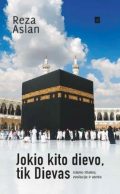 Original language:
English
Original language:
English Translated from: English
Authors: Aslan, Reza
Translated by: Ardickas, Zigmantas
ISBN: 9786094272585
Published in: Vilnius
Published on: 2017
Publisher: Kitos knygos
Reza Aslan is an Iranian-American international writer, a scholar of religions, professor, commentator, host, Emmy nominated producer, and the author of three internationally best-selling books. One of those bestsellers is Zealot: The Life and Times of Jesus of Nazareth published in 2015, in which the author introduces the historical figure of Jesus of Nazareth in an elegantly way by explaining the time and birth of religion. As this author is internationally well known, there is no surprise that his work receives attention and in Lithuania. Jonas Mačiulis (2017) in his review of this book concludes his work with a question: would this author also describe the Islamic prophet Muhammad using similar methods as in the book of Jesus?
In a book “No god but God: The Origins, Evolution, and Future of Islam” Reza Aslan presents Islam prophet Muhammad but moreover, he focuses on the origins of religion, the meaning of the Quran, and reasons of various dogmas and practices developed, and how these developments have determined the various roles of society in both internal and external political life of Islamic communities.
In the updated edition, the author recalls the terrorist attack of 11 of September in 2001, which shocked the world, and resulted that Europeans and North Americans are feeling the fear and resentment from people who are professing Islam. As the author states ‘When I released No god but God in 2005, <…> I wanted to show that Islam is nothing special or extraordinary, that the same historical, cultural, and geographical circumstances that influenced the development of each religion, in every part of the world, it has similarly influenced the development of Islam, making it one of the most elective, diverse religions in the history of religions.’ It is not difficult to understand those words – not every people who consider themselves to be members of one religion will profess and understand that religion in the same way, but historically all faiths have undergone certain changes. As time goes forward and new dogmas are appearing as well appears and believers who profess their faith by creating fear in society distorting the essence of religion and base their beliefs on force and cruelty. Those people are called fundamentalists. So such events as happened in 2001 in the USA, should not be considered as the whole Muslim manifestation.
As history shows, Christianity itself was divided into Catholic and Orthodox communities, and during the Reformation, Catholics split into more branches. Moreover, these days it is well seen that people who live in a democratic society have freedom of religion by choosing what to believe and how to profess faith or be atheist. Therefore, even without knowing the foreign religion, we cannot say that everyone has similar thinking and faith. Unfortunately, the prologue The Encounter of Monotheism is a good illustration of how religious differences also escalate into political ones, when people belonging to different religions and unfamiliar with each other stories and evolution, try to change their faith as in the order of a sacred mission.
For better understanding geographical, historical, and political aspects Reza Aslan adds a map of the Arab people and other cultures territories, in the time of the Prophet Muhamad, and, as a comparison, the second map, which depicts the present times, and the chronological sequence of the most important events. This book creates a whole different approach to the Islamic religion and people, despite knowing this religion as quite young but material provides facts that those people who lived in previous centuries had contact with such religions as Christianity and Judaism, which have become the ideological basis of Islamic monotheism. Furthermore, Islam, Judaism, and Christianity are described as nations of books (Torah, Holy Bible, Quran). There is no exception, that some Arabs had and prayed for many gods and this aspect as well shows a similar evolution story between nations of books. However, the evolution of Islam does not look quite easy. The part of the book where is presented Muhamad’s life and becoming of God’s Prophet on earth is critically evaluated by the author because those who wrote about Muhamad do not live in the same era as him, so biographical stories about him should be read in critical thinking. The clash of faiths and communities and the desire to establish and dominate took place within Islamic nations, so it is not surprising that the disintegration of Islam resulted in the absence of various sects, distorted historical facts, and pure Islam.
According to the author, the Reformation of Islam is already underway – a significant number of respondents say, that they would like to live with democratic ideas, but there are still minorities who spread opposite dogmas compared to Muhamad, a community that taught fourteen centuries ago. The book’s name is well-chosen because it represents real Islam, and as well the author says ‘God may be One, but Islam is certainly not’.
This book is suitable for everyone who wants to clearly understand Islam people and religion, not only keeping in mind questions about what kind of people of Islam should be trustworthy. This Aslan’s work presents not only with what difficulties communities had to deal in previous ages and nowadays, but as well provides interesting facts about Muhamad’s dogmas, true values, compares how the social aspects of Arabia and later times differed from the 7th century, what kind of law schools appeared, and what branches existed and still exists in Islam.
